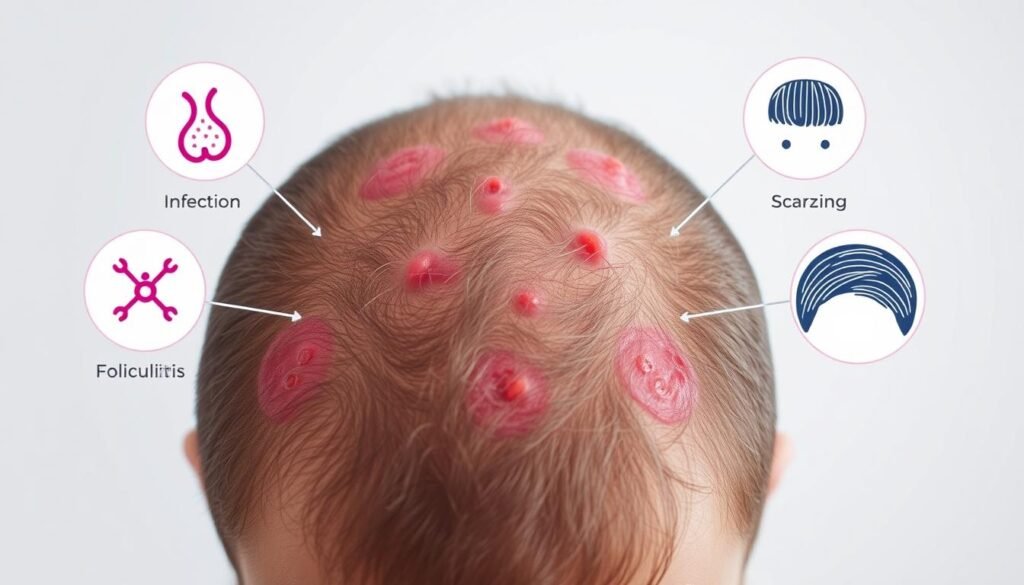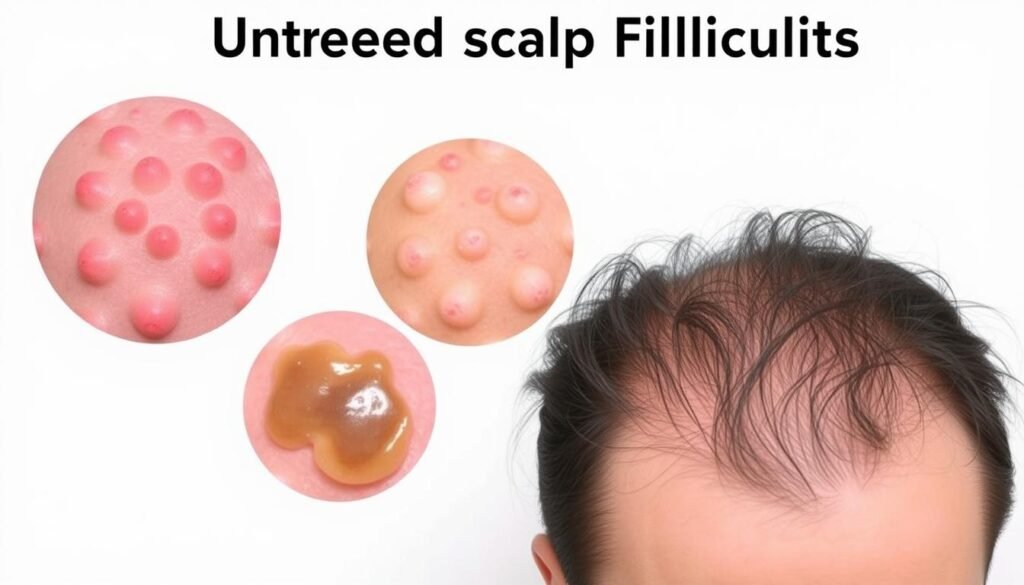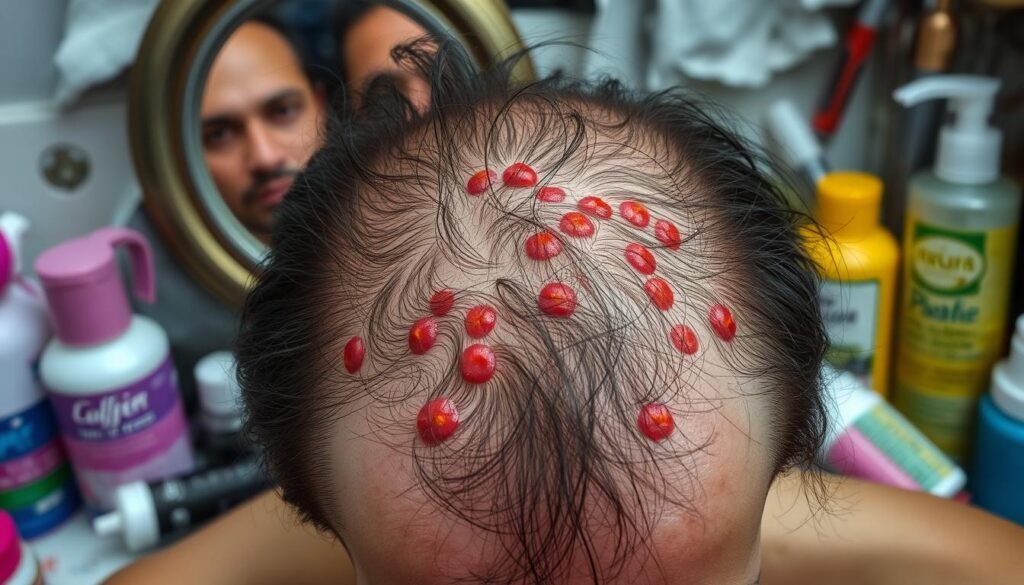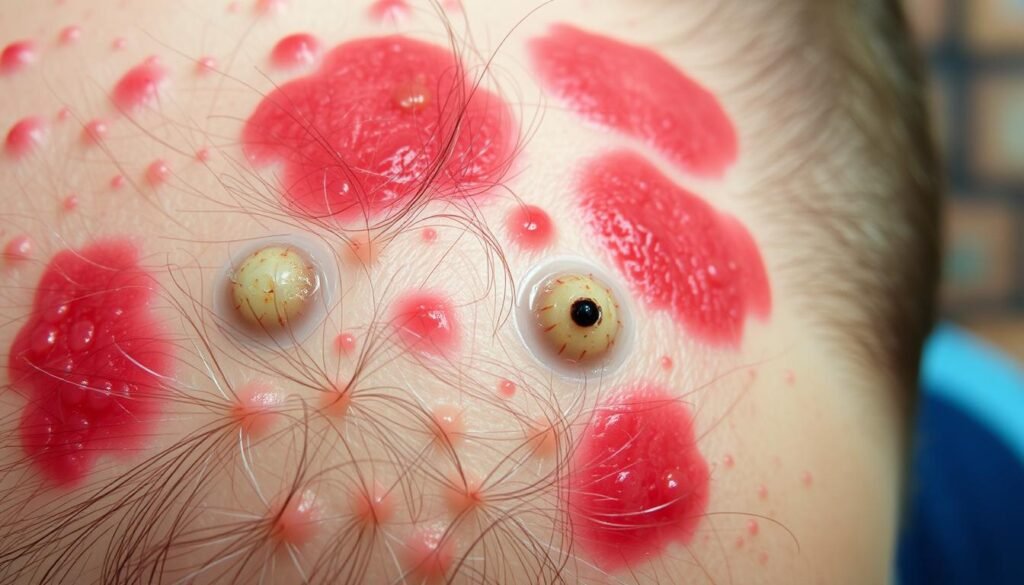Around 40% of people with scalp folliculitis could face serious issues if it’s not treated. This condition is mainly due to bacterial infections. It leads to risks like the spread of infection and losing hair for good. At first, it might just seem like small bumps. But without the right care, these can turn into big health problems. It’s very important to know about these risks to avoid them.
Key Takeaways
- Scalp folliculitis can lead to severe infections and complications if not treated.
- Understanding the symptoms helps in timely intervention for better outcomes.
- Permanent damage like scarring or hair loss can occur from untreated folliculitis.
- Seeking medical advice is crucial if symptoms worsen or persist.
- Good scalp hygiene and preventative measures are key to reducing risks.
Understanding Scalp Folliculitis
What is scalp folliculitis? It’s when hair follicles on your scalp get inflamed. This can happen because of infections or irritation. Staphylococcus aureus, a bacteria, often causes it. Knowing why it happens is key to treating and managing it well.
Several risk factors make a person more likely to get scalp folliculitis. These include having diabetes, using antibiotics for a long time, and shaving often. Using dirty hot tubs or pools, having a weak immune system, and being overweight also increase the risk. It’s important to understand these risks.
Folliculitis has different types like bacterial, Pseudofolliculitis barbae, and Pityrosporum. Knowing the types helps you find the right treatment. Treatments can be creams, oral medicine, or light therapy. Home remedies like warm compresses and keeping clean also help.
Sometimes, scalp folliculitis goes away on its own. But if it doesn’t improve or gets worse, you should see a doctor. Learning about this condition from sources like this link can improve your health.
| Type of Folliculitis | Description |
|---|---|
| Bacterial Folliculitis | Infection of hair follicles typically caused by bacteria. |
| Pseudofolliculitis Barbae | Inflammation caused by hair growing back into the skin, common with shaving. |
| Pityrosporum Folliculitis | Folliculitis caused by yeast infections, often affecting those with oily skin. |
| Eosinophilic Folliculitis | A condition typically seen in immunocompromised individuals. |
| Viral Folliculitis | Inflammation of the follicles due to viral infections. |
Signs and Symptoms of Scalp Folliculitis
Knowing the scalp folliculitis symptoms is crucial for quick treatment. Look for these signs:
- Red, raised bumps around hair follicles
- Pus-filled bumps that can crust over
- Itchy or tender areas on the scalp
If it gets severe, you might get a mild fever and swelling. Don’t confuse scalp folliculitis with acne. Knowing the difference is key to get the right help.
Get to know how bad your symptoms are. This will help you get the correct medical advice. Understanding this helps avoid worse issues like losing hair or skin harm.
| Symptom | Severity Level | Potential Complications |
|---|---|---|
| Red, raised bumps | Mild to Moderate | Increased irritation or infection |
| Pus-filled bumps | Moderate to Severe | Abscess formation or scarring |
| Itchy or tender areas | Mild | Chronic discomfort |
Act early if you notice scalp folliculitis symptoms. Quick action leads to better healing. See a doctor for the best treatment if you spot these signs.
What Happens If Folliculitis Goes Untreated?
Not treating folliculitis can lead to big problems. What starts as a mild issue can become serious, affecting your skin’s health and comfort. Knowing how bad it can get encourages people to seek help early.
Potential for Infection Spread
If folliculitis is ignored, it may spread to nearby skin, causing cellulitis. This bacterial infection is serious and needs quick medical care, especially for those with weak immune systems. It’s important to take steps to prevent this.
Without treatment, folliculitis can worsen and make recovery longer. It spreads easier and complicates the healing.
Development of Severe Infections
Leaving folliculitis untreated can cause big problems like carbuncles or abscesses. These deep skin infections often require medical help, including surgery. Untreated, it could lead to scars or hair loss.
Getting treatment on time can stop these issues and keep skin healthy.
| Risk Factor | Potential Consequence |
|---|---|
| Ignoring Symptoms | Spread of infection |
| Weakened Immune System | Higher risk of severe infections |
| Poor Hygiene | Increased chance of complications |
| Inadequate Treatment | Development of carbuncles or abscesses |
| Chronic Folliculitis | More difficult to treat and control |
Risks Associated with Untreated Folliculitis
Not treating scalp folliculitis brings many risks. If ignored, it can lead to repeated infections that may require stronger treatments. It’s critical for those at risk to be aware of these dangers.
Recurrent Infections
Chronic scalp folliculitis flare-ups often cause skin infections to come back. Each time, the risk of inflammation and discomfort grows. This can make life harder, raising constant worries about skin care.
Treating these infections might mean needing prescription drugs. Often, antibiotics are used to fight the bacteria causing them.
Permanent Scarring and Skin Damage
If you don’t treat folliculitis, scarring can happen. Repeated skin inflammation can lead to lasting damage. Eventually, this may cause permanent changes in skin texture or color, known as hyperpigmentation.
These changes don’t just alter how you look. They can also make you feel self-conscious.

| Risk | Description | Potential Consequences |
|---|---|---|
| Recurrent Infections | Continuous skin infections due to untreated folliculitis | Need for aggressive treatment options like antibiotics |
| Folliculitis Scarring | Permanent skin damage from repeated inflammation | Changes in skin texture and hyperpigmentation |
| Chronic Flare-ups | Ongoing episodes of folliculitis if untreated | Increased discomfort and risk of deeper infections |
Complications of Untreated Folliculitis
If you don’t treat scalp folliculitis, you could face serious health problems. It’s crucial to know these issues to get help early.
Hair Loss and Follicle Damage
Untreated folliculitis can make you lose hair. This happens because the infections damage your hair follicles badly. This permanent damage leads to less hair in the affected spots. It might make you feel sad and hurt your self-image.
Cellulitis and Other Serious Conditions
Not treating folliculitis can cause cellulitis. This happens when the infection goes deeper than the hair follicles. If not treated, it could allow bacteria to spread all over your body. Knowing these dangers highlights why it’s critical to spot and treat the condition early.
How Folliculitis Progresses Without Treatment
Folliculitis starts with slight redness or irritation near hair follicles. It can turn into pus-filled blisters if ignored. In early stages, some might overlook their symptoms, thinking they’re not serious. But as the condition gets worse, deep infections can form. This can lead to abscesses and more pain.
The longer folliculitis is left alone, the more risky it gets. It’s key to get it checked and treated early. Waiting too long can lead to permanent skin damage. So, getting regular check-ups and treatment is very important.
Knowing exactly what type of folliculitis you have is crucial. There are different kinds, and each one needs a specific treatment. This might include creams, antibiotics, or even surgery. Getting help from a doctor is the best way to stop it from getting worse.
Learning about folliculitis and its stages is helpful for timely action. Not paying attention to it can make a small problem big. So, it’s important to know about it and take action early.

Long-term Effects of Untreated Folliculitis
If you don’t treat folliculitis, it can badly affect your life. It can cause ongoing problems for years.
Chronic Discomfort and Pain
One major issue is long-lasting pain. This pain comes from skin inflammation and irritation. It leads to constant itching and burning.
Because of this, doing everyday things becomes hard. This affects a person’s happiness and health.
Changes in Skin Texture and Color
Another problem is skin texture and color changes. Untreated folliculitis can create rough spots and dark areas. This makes the skin look worse over time.
These skin changes make people feel bad about themselves. It adds to feeling upset.
It’s vital to get treatment to avoid these issues. Seeing a dermatologist can help with the physical and mental troubles of folliculitis. For more info, check out this detailed guide.
Ignoring Folliculitis Symptoms
Ignoring the signs of folliculitis can have major impacts on your health. Early symptoms might look minor or like they’ll go away on their own. But looking the other way can make things much worse.
Not treating folliculitis can lead to more serious problems that harm your well-being. The itchiness and irritation can get worse if you don’t act quickly.
Knowing the risks of waiting too long for treatment is key. Folliculitis comes in various forms like hot tub rash and razor bumps. Each type has its own causes, so it’s crucial to spot them early.
If ignored, these symptoms can turn into nasty infections needing hard and expensive treatments.

Staying clean and looking after your skin can help you manage folliculitis. Seeing a doctor early can avoid a lot of trouble and discomfort. It also prevents scars. Getting ahead of folliculitis symptoms is smart. It stops bigger health issues later on.
Consequences of Not Treating Folliculitis
If you ignore folliculitis, you might face serious effects beyond just your skin’s health. This issue can lead to day-to-day struggles and emotional upset because of constant pain and noticeable skin changes. Folks with folliculitis often feel embarrassed and lose confidence.
Impact on Quality of Life
Not treating folliculitis can hurt your mental health for a long time. As the condition gets worse, people may start avoiding going out or seeing others. This can make them feel isolated. Also, having obvious symptoms like red, sore bumps can make a person feel really bad about themselves.
It can also make choosing what to wear hard, as some outfits might hurt or irritate the skin. Worrying about scars can cause a lot of stress and anxiety. Knowing how untreated folliculitis affects your life should push you to find treatment. For tips on handling it, check out this resource.
| Consequences of Untreated Folliculitis | Impact on Quality of Life |
|---|---|
| Potential scarring | Decreased self-esteem |
| Emotional distress | Social isolation |
| Pain and discomfort | Reduced confidence |
Conclusion
Understanding untreated folliculitis shows it’s important for someone with symptoms. It can cause repeat infections and harm your skin. It’s crucial to know that not treating it can lead to lasting problems.
Knowing what can happen if you ignore folliculitis helps. It makes you see the benefits of looking after your health. Getting help early stops worse issues and leads to a healthier life.
Not paying attention to symptoms can cause big trouble. It’s key to look after your skin and overall health.
In the end, dealing with scalp folliculitis improves life and lessens pain. Knowing what to do and getting the right treatment make your skin and health better.
